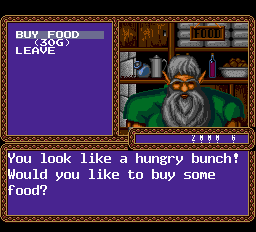I did not finish this one, though not for lack of trying. The wonderful PC Engine version, with a full soundtrack and beautiful spritework finally got a fan translation recently so I made it my version of choice, but the further I got into the game the more and more it just would not stop crashing. And it broke my heart, because this game is really damn good.
It does not make a particularly strong first impression. The choice to make the entire world, essentially, one contiguous dungeon initially felt offputting to me. Ultima may have shallow dungeon crawling and kind of crappy combat but the one thing it had, the thing that Dragon Quest knew to steal almost 1 for 1, is the abstracted overworld. Dungeon Crawling isn’t so much an activity done inside a dungeon so much as it is a gameplay style that evokes a certain tone and mood. Wizardry’s first person perspective, the inability to see what is mere steps away, create an ever present anxiety and tension that is not present in that game when you’re going shopping. In Might and Magic, you have to individually map out every single town and even inside their walls aren’t safe from random encounters. There’s towns, dungeons and castles – all connected by a massive overworld, and every moment takes place from the perspective of the desperate first person crawl.
It leads to a game that is slow and deliberate – some might say tedious – but I started to be won over after I gained my first few levels and visited the tavern to listen to the local rumours.
The Bard’s Tale had puzzles, but its hints were cryptic riddles, that feel like they encourage a more collective style puzzle solving that persists through the genre to this day. Might of Magic is far more direct; the game is the antithesis of Dragon Quest in every way and yet the one thing it shares is the clarity of communication when it comes to what to do next. You are rewarded very directly for talking to everyone, exploring the towns to their fullest. The overworld is littered with signs pointing you on your way. If you pay attention, Fast Travel isn’t just convenient and easy but neccessary for avoiding the dangerous monsters that lurk in the wilds. Once you get used to its rhythms, Might and Magic is ultimately not a Dungeon Crawler in the literal sense – when everything is a dungeon, nothing is – you aren’t descending through a linear progression you’re crisscrossing your way through a vast and open world with your smarts and inginuity as much as you are with your sword.
Not to say your sword isn’t important. Combat has far more in battle complexity than anything I’ve played so far, and while the game allows for tons of freedom in party composition (even dynamic multi-party playthroughs are supported, as you can rest different characters in different inns all over the game world), it is clearly intended and balanced for six characters of the six classes avaliable. Battles are tough from the start and you are immediately out-numbered and out-classed by the foes the game send your way. There is no easing you in. Yet you gain power relatively quickly, and with a couple of levels and a few good equipement slots you can hold your own and make progress through encounters that seem completely unwinnable at first blush. It’s certainly time consuming but incredibly satisfying, which is really a summation of the entire game.
Which brings us back to the start and the tragic reality of these old western RPGs. Ultima is owned by EA, and Might and Magic owned by Ubisoft. These companies are absolutely never going to give a fuck enough to port them to modern storefronts beyond letting GOG host DOS roms, let alone to preserve all the various versions from the wild west years before PC development simply meant Windows. I couldn’t have known when I started, but the fanpatch I used was ultimately too unstable and eventually was crashing every ten minutes. The translation was pretty poor throughout and there were definitely occasional moments of garbled characters and unclear text. These games are important, I’m going back and playing them because I believe that in my heart, and it is wild to me how little respect for the history of these things there is. The Bard’s Tale trilogy is a great exception, but it only exists because of a kickstarter. The situation is a little better with JRPGs but only with the flagship franchises of companies that still exist. I tried to get Xanadu working as it is unquestionably a pivotal moment in the development of pre-Dragon Quest RPGs and simply could not do it.
We’re not exactly talking rarities here. These are some of the most successful games of one of the most popular genres in the the medium’s short history. It’s a crying shame. I imagine we will continue to run into these roadblocks all the way through the 2000s as I make this journey. But shout out to all the unpaid volunteers who develop emulators, fanpatches, romhacks and the like and actually keep this history alive. You the real heroes here.
One final note: if your twist is that your fantasy story is secretly sci fi I will be ultimately sad that I had to play the game with kings and thees and thous when I could have been on a fuckin spaceship the whole time. No need to play coy with me.

